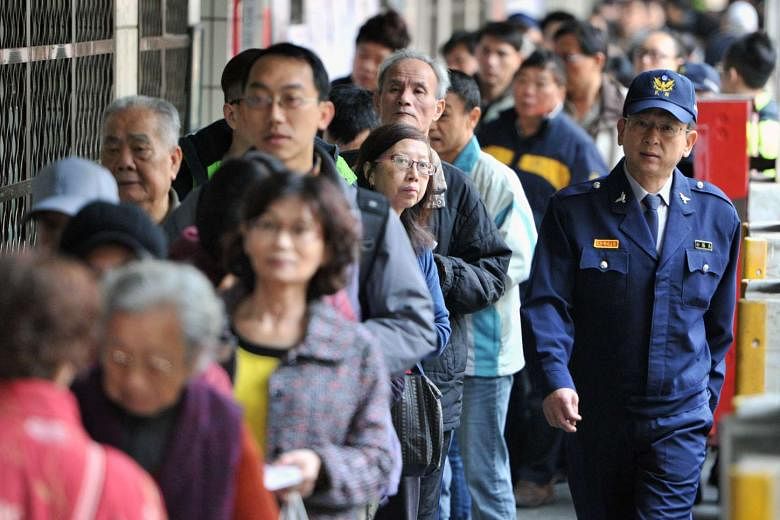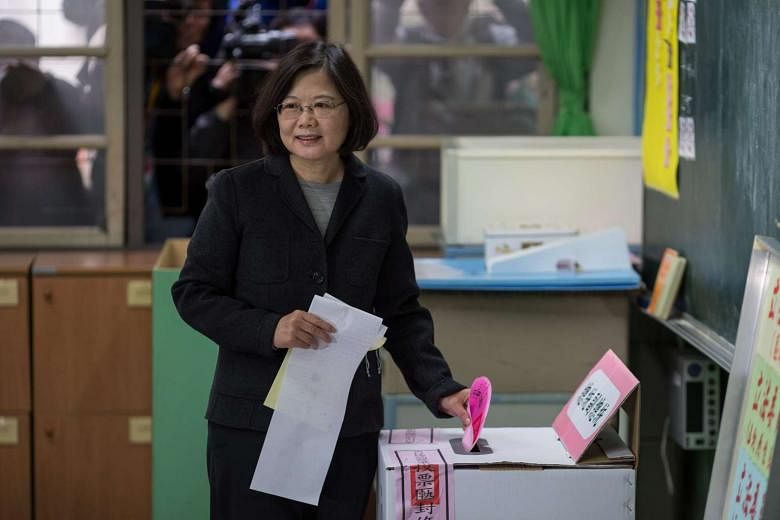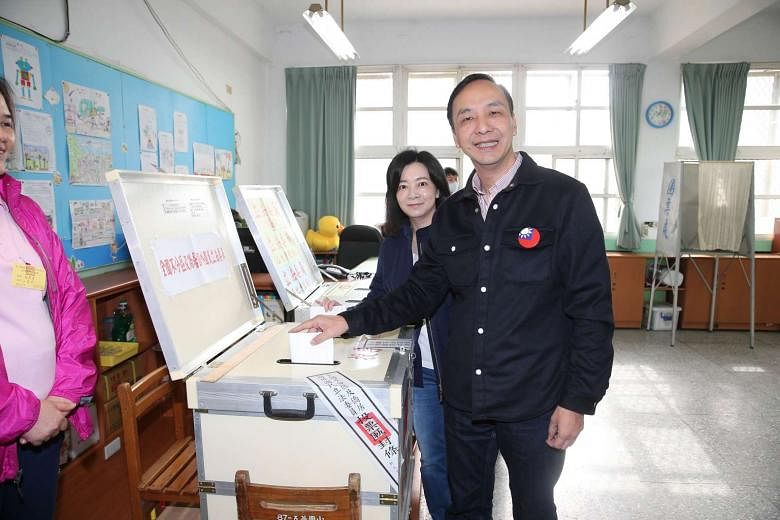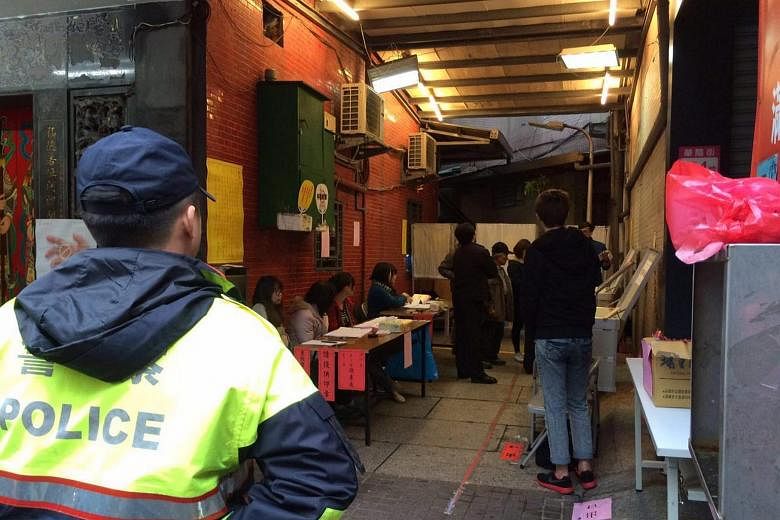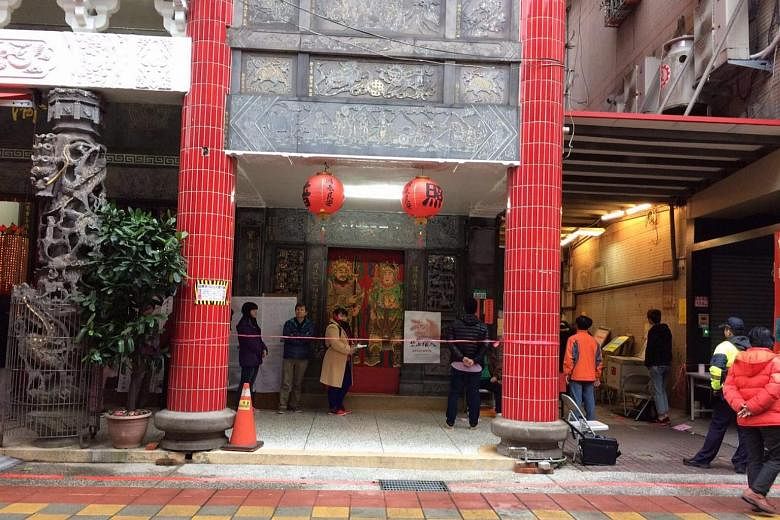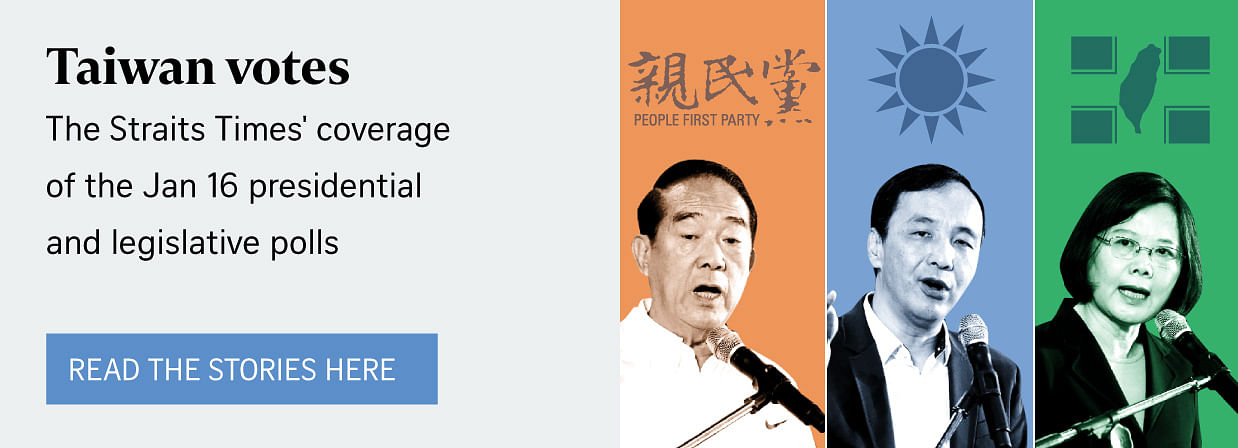Polls have closed in Taiwan, and voters are expected to elect into power the island's first woman president - and one likely to usher in an era of more uncertain relations between the island and China.
Voting began at 8am local time on Saturday (Jan 16), and concluded at 4pm. Democratic Progressive Party (DPP) candidate Tsai Ing-wen is leading with 5m votes, followed by Kuomintang's (KMT) Eric Chu, 3m, and the People First Party's (PFP) James Soong, at 880,000, ETtoday reported. Follow The Straits Times' live updates here.
When polls opened at 8am, The Straits Times saw a queue of some 20 people had already formed at a polling station next to a temple in Huayin Street in Taipei.
Based on previous elections, official results may be out at around 8pm, though they could be known earlier if the winner romps to victory by a landslide.
Presidential forerunner Tsai of the pro-independence DPP is expected to trounce her rivals Eric Chu of the Kuomintang (KMT) and James Soong of the People First Party (PFP).
Speaking to reporters after casting her vote near her home in New Taipei, Ms Tsai said she slept well. "I have already put in my best, we will now have to leave it to the citizens.... We are confident."
Mr Chu also cast his ballot in New Taipei, where he is mayor.
One of the voters at Huayin Street, engineer Ellen Chen, 54, said it is an important election as she hopes to see the entrenching of the DPP as an alternative party in Taiwan.
"It is not good for the KMT to be in power all the time," she said.
If Ms Tsai is elected, she added, it will be a proud day for Taiwan to have its first female president.
But what is more important is that she gets knuckling down to solving Taiwan's challenges - the economy and cross-Strait relations.
"We are losing out to the rest of the world in terms of competitiveness," she said.
Another voter, businessman Tsai Pao Chien, 61, took the opportunity to pray at the temple just before voting. "I'm praying for Taiwan, may it resolve its problems and that the economy will get better," he said.
He said that he is supporting Ms Tsai and the DPP.
"Taiwan is in urgent need of reforms. The legislature is in a mess, our leader's abilities are found wanting.
"I believe that Ms Tsai can help unify Taiwan, and walk a middle path in our relationship with China."
Taiwan will also be electing its Parliament on Saturday. A total of 546 candidates from 18 parties are vying for 113 seats up for grabs.
Of these, 73 are elected under a first-past-the-post system in single-member constituencies. Another 34 are at-large seats elected on a second ballot for parties based on nationwide votes. The six remaining seats are in two three-member wards and elected by aboriginal voters.
If chosen, Ms Tsai, 59, will be Taiwan's second president from the DPP, after Mr Chen Shui-bian.
Her leadership at the helm will likely mark a shift from the detente in cross-Strait relations that current President Ma Ying-jeou of the KMT had made a centrepiece of his eight-year government.
He recognises the so-called 1992 Consensus, which states that both sides believe in one China but differ in what that China refers to. With this premise in place, both sides had inked some 20 trade agreements, and liberalised flights and the flow of tourists across the Taiwan Strait.
But the closer relationship is controversial among the Taiwanese, who fear that China is gaining too much influence in the island's economy. At the same time, many do not feel the benefits of the warmer ties trickling down to them.
This comes in tandem with a rising Taiwanese identity and dwindling support for any sort of unification with China.
The unease led to a student activist-led Sunflower movement in 2013 to occupy the legislature in protest of the ratification of a trade services pact.
Moving in sync with such sentiments, Ms Tsai has remained non-committal on the 1992 Consensus, saying only that it is one of various options defining cross-Strait relations - a stance that Beijing has taken umbrage at.
Chinese President Xi Jinping has said that it is a fundamental principle without which "there will be no possibility of peace or development".
KMT's Mr Chu has called on voters to support him, to "ensure the stability of Taiwan".
Additional reporting by Jermyn Chow

